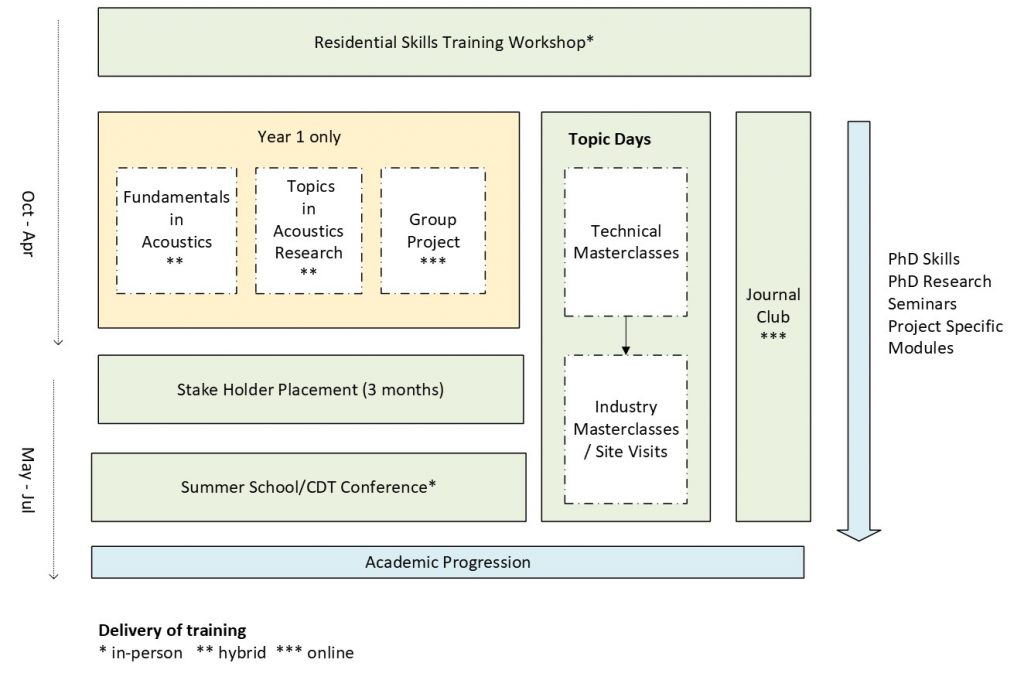Training Programme
Our training programme is uniquely designed for the CDT, with students, academics, and industry partners working together to shape its content and direction . While students gain deep, specialist knowledge in acoustics, the programme also emphasizes a broad set of transferable skills and knowledge of how sound fits into industry, society and the public sector. This combination ensures graduates are not only experts in their field but also equipped to pursue diverse career paths and tackle complex, interdisciplinary challenges.
Cohort Based Training
Our cohort training provides students with diverse opportunities to collaborate across universities whilst fostering a strong sense of community and identity.
We offer a blend of engaging activities, including:
- Face-to-face experiences such as residential events, topic days, and summer schools
- Online sessions like masterclasses and journal clubs
- Hybrid delivery of CDT modules for flexible learning
This approach ensures meaningful cohort engagement while considering environmental sustainability and the needs of students with caring responsibilities. By balancing accessibility with in-person interaction, we create an inclusive and dynamic training environment that supports academic growth and collaboration.
CDT Training Building Activities
Alongside the PhD research skills offered by each partner university to their students, the CDT programme is delivered as a number of training blocks to provide training appropriate to the student’s PhD journey.

Our PhD students come from a very diverse range of degrees and professional experience. To ensure that students develop the basic technical skills and knowledge required for research across our four themes, our year 1 modules and training activities provide a solid grounding in:
- fundamentals of acoustics and vibrations,
- signal processing and digital signal processing,
- mathematics and statistics,
- computing,
- psychophysics, perception and effects of noise on humans
Our other CDT training activities are designed for students to attend and engage in alongside their PhD research project, enabling them to develop and tailor specialist skills to support their PhD journey. These training activities include:
Residential Workshops
Each year, students attend a 5-day residential at one of the partner universities. To kick-start cohort building, the first residential for each cohort includes sandpit to explore Sound Futures from different disciplinary perspectives. Guest speakers set out the industrial, academic and partner perspectives. From this, cross-site, interdisciplinary problem-based-learning group projects are developed and undertaken facilitated by experienced supervisors.
To meet the CDT learning outcomes and supplementary skills, residentials for students in Year 2 and Year 3 focus on activities such as hackathons, designed to train students in both technical skills (e.g., simulation tools) and key skills such as creative approaches to problem solving or entrepreneurship. Each residential workshop focuses on 1 or 2 of our research themes.
Topic Days
Topic days are in-person activities at a partner university and/or project partners. All PhD students undertake a specific training session, such as state-of-the-art measurement techniques. Other topic days include: attending an audiology clinic and gaining exposure to hearing aids and cochlear implants in Southampton; undertaking physiological measurement as part of the research theme into human perception of sound at Salford. From Year 3, topic days are organized by the students aligned to a specified research theme.
Summer School
Our 5-day summer school, incorporating a one-day annual conference, is highlight of the CDT training programme and is attended by all supervisors and project partners. Summer schools are hosted by the partner universities on a rotational basis, and provide the platform for training, scientific discussion, and generation of new ideas, with focus on seminars and hands-on training.
Each summer school has core content around one of the research themes. For example, machine learning, software and data carpentry, data protection, curation and management, privacy, and ethics of data collection, run by Computer Science at Sheffield.
The summer school also incorporates a one-day annual conference co-organised by our CDT students and supported by the Institute of Acoustics (IoA) and The UK Acoustics Network (UKAN+). The annual conference is an opportunity for CDT students to present and discuss their work with the CDT and wider community (including non-CDT Acoustics PhD students).
Masterclasses
Masterclasses offer students the opportunity to gain world-leading expertise across the CDT universities, external universities, industry, and other partners across our 4 research themes. These are usually online activities but focus on discussion, problem-solving and audience engagement rather than one-way information flow.
Journal Club and Seminars
These online activities are run by students with support from academics, as part of the students developing their organisation and networking skills. The seminar series build on the existing and successful UKAN+ seminars, which already attract speakers and participants from around the world.
Placements
Each student undertakes at least one substantial placement at one of our partners. The CDT placements ensures that students are connected to the latest developments, real-world applications and pathways to impact. The placements give students access to unique data, case studies, measurement and simulation tools. Placements also offer an insight and professional experience and allow students to engage with a more diverse group of people.
Students on placement apply elements of academic learning in the workplace and develop valuable skills including time management, business communication, project work and working in a team. Placements in industry and academic partners play an important role in ensuring students learn about context and how to create impact.
Career Development Plan (CDP)
Each CDT student’s individual PhD journey will be supported by a personal CDP, developed together by the student, their supervisors, advisors and the Director of Studies. A CDP enables each student to plan, tailor and record their training progress.
At the start of their PhD registration, each student’s individual CDT training for year is identified, and then annually reviewed to identify future training, placements, publications conferences, and where appropriate, opportunities for exposure to other disciplines and sectors across the CDT.